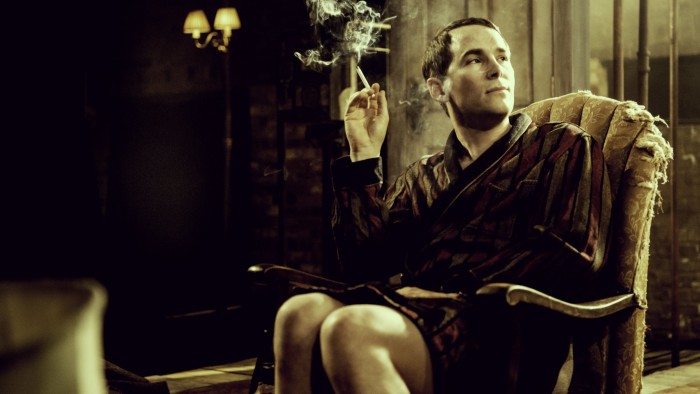Kenny Morgan, Arcola Theatre, London — ‘Deft and witty’

Roula Khalaf, Editor of the FT, selects her favourite stories in this weekly newsletter.
A motionless body beside an unlit gas fire; panicked neighbours; a suicide narrowly averted. This is the opening of Terence Rattigan’s The Deep Blue Sea. It is also the start of Mike Poulton’s new play — and it is no accident that the sequences are so similar. Poulton’s drama delves into the biographical tragedy behind Rattigan’s masterpiece: the actual suicide of his former lover Kenny Morgan. What follows is a sort of roman à clef in reverse, in which Poulton imagines the real-life events that were to emerge, transposed, in Rattigan’s drama.
It’s more than just a literary game, however. Poulton’s revealing play digs into the agonies of unrequited love and of forbidden desire: in 1949 homosexuality and attempted suicide were illegal. Here, the grubby little flat in which Morgan lives becomes emblematic of a society where shame is a major impetus, where moral slip-ups are hushed up by backstreet doctors and where the landlady’s first concern on finding Morgan’s body is the potential scandal. When Rattigan, summoned by one of the neighbours, arrives in full dinner dress, he looks like a creature from another planet, his very appearance symbolic of the gulf between his public and private life.
It’s deftly and wittily done. Poulton, who often translates and adapts for stage (including the Royal Shakespeare Company’s Wolf Hall), demonstrates a fine ear for details of speech and Lucy Bailey’s evocative production responds with period precision. There’s plenty of spiky humour: “I expect there are urchins throwing stones at the Rolls,” observes Simon Dutton’s urbane Rattigan.
But at the play’s heart is a depiction of the loneliness of despair. Morgan, trapped between Alec (Pierro Niel-Mee), his unfaithful lover, and Rattigan, who will take him back on condition he remains hidden, is desperate. Paul Keating conveys the growing panic of a man who can’t haul himself back on to solid ground, despite the interventions of a kindly neighbour (Matthew Bulgo), who extols the benefits of “being ordinary”, and a tough-talking Jewish refugee doctor (George Irving), who puts his pain into perspective.
The play loses impact by being overlong and rather clumsily plotted in places: the final intervention by Alec feels particularly rushed. And despite the length, there isn’t room for Alec to appear much more than a heartless egotist. Even so, this is an eloquent and compassionate response to Rattigan’s great play, which the National Theatre is about to revive.

To June 18, arcolatheatre.com
Comments